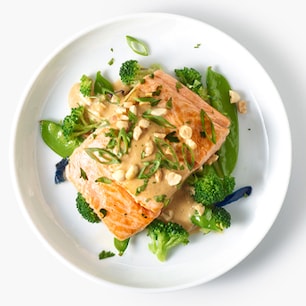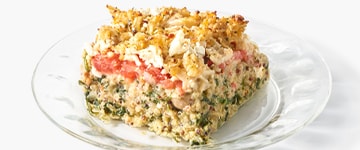Published June 1, 2023
When it comes to wellness, physical health tends to be a priority. But a close runner-up may be keeping a sharp mind. We now know that diet and lifestyle are linked to brain health and are important from infancy to adulthood. Both men and women are at risk for decline in cognition or mood-related disorders, but there are separate, increased risks for each gender. For example, men have a higher incidence of stroke,1 developing Parkinson’s Disease,2 and are 3.5 times more likely to suffer from depression-related suicide than women.3 Although genetics and other factors can have a strong influence on development of certain diseases, we shouldn’t shy away from incorporating things that could support our brain’s health into our diet and lifestyle.

Mind your brain.
The human brain is the most complex organ in the body. It’s the command center that influences thought, memory, emotion, and touch. It controls motor skills, vision, and breathing. It plays a role in every process that regulates our body—things like temperature, hunger, our heartbeat, and digestion.4 Keeping our brains healthy is a multifaceted effort because of how comprehensive the brain is. Two facets include our lifestyle and the vitamins and minerals we use to nourish our body. These vitamins and minerals embedded in foods play specific roles in supporting the brain, memory, and motor functions, as well as learning, our bodily senses, and mood. Some of these nutrients are omega-3s, B vitamins, choline, and zinc. Let us break some of these down a little bit.
Omega-3s.
The brain consists of 60% fat: docosahexaenoic acid (DHA)—which is the highest amount found in the brain—while and eicosapentaenoic acid (EPA) composes the rest.5 DHA and EPA play a role in neurons sending messages between the brain, protecting nerve fibers when the brain has been injured.6 In fact, studies have found certain neurological disorders such as dementia, Alzheimer’s, Parkinson’s, and mood-related disorders including depression may benefit from adequate intake of DHA and EPA.7 8 The recommended daily allowance (RDA) are average daily levels of intake to meet nutrient requirements. The RDA for men aged 14 and older is 1.6 grams/day. The RDA for women aged 14 years and older is 1.1 grams/day.9
The best food sources of EPA and DHA can be found in a 3.5 oz serving of mackerel10 (4,580 mg), salmon11 (2,150 mg), herring12 (2,150 mg), or sardines13 (1,463 mg).
Try our delicious salmon recipe, Thai-Style Tahini Salmon with Stir-Fry Vegetables, to add omega-3s to your diet.
B vitamins.
These vitamins play a critical role in converting food into energy, as well as helping in the production of neurotransmitters like serotonin.14 In fact, depression, dementia, diminished memory, and impaired cognition are often associated with a B-vitamin deficiency.15 Vitamins B1, B3, B6, B9, and B12 are essential for neuronal function and deficiencies have been linked to depression.15
RDA: B vitamins vary on recommended daily allowances as there are eight in total with different recommended intake levels. Read the supplement facts sheets* to find out more.
Best food sources: beans, nutritional yeast, wheat germ, leafy greens, chicken, dairy, eggs, fish, cooked oysters, crab, mussels.
Choline.
The body produces small amounts of choline in the liver but doesn’t produce enough for what the body needs, therefore we must obtain it from diet. Choline aids in building cell membranes and neurotransmitter functioning from memory storage, muscle control, and mood.16 It’s needed to make the neurotransmitter acetylcholine, which is involved in memory and learning.17 Dopamine release is impaired in Parkinson’s disease, affecting motor control, cognition, and mood. Acetylcholine helps normalize dopamine release.18 Men are 1.5 times more susceptible to Parkinson’s Disease than women.19
RDA: Age 19+ years – Male 550 mg/day; Female 425 mg/day.20
Best food sources: 3 oz liver (356 mg), 1 egg (147 mg), 3 oz chicken breast (72 mg), ½ cup soybeans (107 mg), ½ cup kidney beans (45 mg).20
Zinc.
When we think of zinc, we think of its role in supporting our immune system, but it goes beyond this and helps support our brain health. It plays a role creating new neurons that function in our memory storage.21 Zinc status is hypothesized to affect Alzheimer’s disease progression.22 In fact, adequate levels may slow the progressive decline in those with Alzheimer’s.22 Low zinc levels have also been associated with depression and depressive-like symptoms.23
The RDA for men aged 19 and older is 11 milligrams/day. The RDA for women aged 19 years and older is 8 milligrams/day.24
Best food sources: 3 oz cooked oysters (32 mg), 3 oz crab (3.2 mg), fortified breakfast cereals (2.8 mg), 1 oz pumpkin seeds (2.2 mg).24
To add more zinc to your day, try our Publix Aprons recipe, Quinoa and Crab Breakfast Bake.
We should always aim to meet our daily recommended allowances (RDA) with a variety of foods. If you struggle to meet any RDA, supplementation may be warranted. Supplements are a common way to help you get your daily requirements of vitamins and minerals. We recommend always consulting your healthcare provider before embarking on any supplement regimen.
For the love of you.
Choosing how you eat is uniquely personal. It’s about your needs, your preferences, and your goals. As your wellness ally, we’re in your corner with fresh ideas, recipes, and wellness icons that make it easier to shift toward wiser food choices. It’s all about you, at your very best.
Sources
1 Men and Stroke. Centers for Disease Control and Prevention. June 7, 2022.
2 Cerri, Silvia, Liudmila Mus, and Fabio Blandini. Parkinson's Disease in Women and Men: What's the Difference? National Library of Medicine. July 30, 2019.
3 Suicide statistics. American Foundation for Suicide Prevention. Accessed March 3, 2023.
4 Brain Anatomy and How the Brain Works. Johns Hopkins Medicine. Accessed February 15, 2023.
5 Weiser, Michael J., Christopher M. Butt, and M. Hasan Mohajeri. Docosahexaenoic Acid and Cognition throughout the Lifespan. National Library of Medicine. February 17, 2016.
6 Kumar, Parvathy R., Musthafa Mohamed Essa, Samir Al-Adawi, Ghazi Dradekh, Mushtaq A. Memon, Mohammed Akbar, and Thamilarasan Manivasagam. "Omega-3 Fatty Acids Could Alleviate the Risks of Traumatic Brain Injury – A Mini Review." National Library of Medicine. Accessed February 15, 2023.
7 Reimers, Arne, and Hanna Ljung. "The emerging role of omega-3 fatty acids as a therapeutic option in neuropsychiatric disorders." National Library of Medicine. June 24, 2019.
8 Omega-3s and Brain Health. Brain Health Education and Research Institute. Accessed February 15, 2023.
9 Omega-3 Fatty Acids. National Institutes of Health. Last modified February 15, 2023.
10 U.S. Department of Agriculture. Fish, Mackerel, Salted. FoodData Central. April 1, 2019.
11 U.S. Department of Agriculture. Fish, Salmon, Atlantic, Farmed, Cooked, Dry Heat. FoodData Central. April 1, 2019.
12 U.S. Department of Agriculture. Fish, Herring, Atlantic, Kippered. FoodData Central. Last modified April 1, 2019.
13 U.S. Department of Agriculture. Fish, Sardine, Atlantic, Canned in Oil, Drained Solids with Bone. FoodData Central. Last modified April 1, 2019.
15 Mikkelsen, Kathleen, Lily Stojanovska, and Vasso Apostolopoulos. The Effects of Vitamin B in Depression. National Library of Medicine. Accessed February 16, 2023.
16 Choline. National Institutes of Health. June 2, 2022.
17 Gibb, Alasdair J. Choline and Acetylcholine: What a Difference an Acetate Makes! National Library of Medicine. January 25, 2017.
19 Wooten, G.F., L.J. Currie, V.E. Bovbjerg, J.K. Lee, and J. Patrie. Are Men at Greater Risk for Parkinson's Disease than Women? National Library of Medicine. April 2004.
20 Choline - Health Professional Fact Sheet (nih.gov)
21 Lester, Deranda B., Tiffany D. Rogers, and Charles D. Blaha. Acetylcholine–Dopamine Interactions in the Pathophysiology and Treatment of CNS Disorders. National Library of Medicine. March 29, 2010.
22 Rivers-Auty et al. Zinc Status Alters Alzheimer's Disease Progression through NLRP3-Dependent Inflammation. JNeurosci. March 31, 2021.
23 Piao, Meihua, Xiaoqiang Cong, Ying Lu, Chunsheng Feng, and Pengfei Ge. The Role of Zinc in Mood Disorders. Neuropsychiatry. Accessed February 16, 2023.
24 Zinc. National Institutes of Health. Accessed February 16, 2023.
*By clicking certain links in this article, you will leave publix.com and enter outside websites that Publix does not operate or control.

 You are about to leave publix.com and enter the Instacart site that they operate and control. Publix’s delivery and curbside pickup item prices are higher than item prices in physical store locations. Prices are based on data collected in store and are subject to delays and errors. Fees, tips & taxes may apply. Subject to terms & availability. Publix Liquors orders cannot be combined with grocery delivery. Drink Responsibly. Be 21. For prescription delivery, log in to your pharmacy account by using the Publix Pharmacy app or visiting
You are about to leave publix.com and enter the Instacart site that they operate and control. Publix’s delivery and curbside pickup item prices are higher than item prices in physical store locations. Prices are based on data collected in store and are subject to delays and errors. Fees, tips & taxes may apply. Subject to terms & availability. Publix Liquors orders cannot be combined with grocery delivery. Drink Responsibly. Be 21. For prescription delivery, log in to your pharmacy account by using the Publix Pharmacy app or visiting 
